What's New
Displaying results 1921 - 1930 of 4914

Resource | Publications,
The UNAIDS Secretariat Gender Action Plan - developed through a consultative, interactive process involving staff across the Secretariat– comprises measures to be taken in seven strategic focus areas, as well as six numeric targets for monitoring progress towards achieving gender equality in the Secretariat across all levels, with particular attention to senior positions. A central aim of the Secretariat Gender Action Plan is to reach 50/50 gender parity at all levels, but the plan goes beyond numerical targets, and is designed to nurture a supportive organizational culture for all staff.
Following consultation and review in 2015, the Action Plan was updated and extended to March 2018, giving the Plan an overall timeframe of five years: 2013 – 2018.

Resource | Publications,
The Belt and Road is about inclusiveness and connecting the dots across borders, issues and agendas for mutual benefit and development. It is a people-centred approach. Without this, there can be no transformation in health. The beauty of the Belt and Road is that it is about mutual respect and mutual benefit.

Resource | Publications,
For UNFPA, innovation means inclusively creating and scaling-up data-driven, sustainable and open solutions that accelerate the achievement of transformative results in the lives of women, adolescents and youth.
The UNFPA Innovation Fund, established in 2014 with an initial contribution from the Government of Denmark, was conceived "as a tool for generating a cultural shift within UNFPA by providing motivation and a mechanism for staff to generate, fund and implement innovative ideas." It has two main streams, culture and projects.
This short report showcases how UNFPA’s Innovation Fund has pioneered innovative strategies that are changing the way the organization works. It outlines what the Fund has achieved, who its partners are, what has been learned and its plans to move forward.
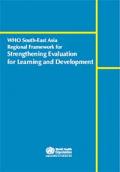
Resource | Publications,
The WHO South-East Asia Region’s Framework for Strengthening Evaluation for Learning and Development (FSELD) has been formulated to guide the Regional Office and WHO country offices in their evaluation work. Its provisions are consistent with the WHO Evaluation Policy 2012, Evaluation practice handbook 2013,1 and A framework for strengthening evaluation and organizational learning in WHO, 2015 (the “global framework”). The FSELD mirrors the structure of the global framework, and builds on a working paper that was developed after a series of consultations with regional departments and WHO country offices.
The objective of this FSELD is to strengthen the current decentralized evaluation function in the WHO South-East Asia Region, and further mainstream its activities. This will nurture the “culture of evaluation” and ensure that evaluation plays a critical role in improving performance, increasing accountability for results, and promoting organizational learning and development.
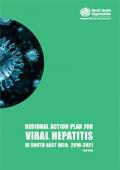
Resource | Publications,
The Action Plan (2016-2021) for addressing viral hepatitis in the WHO South-East Asia Region has been developed in consultation with Member States, community stakeholders, development partners, academia and professional societies. Drawing upon the Global Health Sector Strategy for Viral Hepatitis (2016–2021) and using the framework of universal health coverage to ensure that no one is left behind, the Action Plan provides a roadmap for priority areas of focus and interventions within the health and related sectors that are needed at the national level to mount an effective and efficient response to prevention, diagnosis, management and care of viral hepatitis.
With the goal of ending viral hepatitis as a public health threat by 2030, the Regional Action Plan will provide an actionable framework for implementing evidence-based interventions at scale. It will be informed through strategic monitoring of the response, that must be equitable and sustainable and allow for innovations for acceleration and reaching out to all in need with health services.

Resource | Publications,
The Alliance Strategy (2016-2020) HIV, Health and Rights and theory of change describe ‘using a person-centred approach’ to increase access to quality HIV and health services and to realise the human rights of people living with HIV and others affected by HIV.
As the HIV response becomes increasingly biomedical, we believe it must also be firmly embedded in rights-based and community-led approaches, and in the principles of Greater Involvement of People living with HIV and Positive Health, Dignity and Prevention, all of which have been the bedrock of the AIDS response so far.
At its most basic level, we look at health from an individual perspective, placing individuals at the centre of our HIV response. We consider health as much more than the absence of illness and think holistically about an individual’s full range of needs, desires, capacities and human rights.
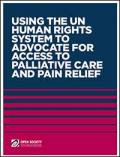
Resource | Tools,
Palliative care seeks to relieve suffering and improve quality of life for those with life-limiting conditions. It is a holistic approach that improves quality of life for patients and their families by addressing the psychosocial, legal, and spiritual problems associated with life-threatening illness. Palliative care has been shown to be highly effective in managing pain and physical symptoms, and can improve adherence to medications. It is a core component of health care and of the human right to the highest attainable standard of health. It is also connected with a range of other rights and is increasingly recognized as a stand-alone right.
This toolkit is intended to serve as a resource for organizations considering advocating for increased access to palliative care and pain relief as a human right within the United Nations human rights system. It clarifies what human rights are and how they are relevant to palliative care, as well as what the UN Human Rights System is. It also presents why and how to engage with the UN human rights system to advocate for increased availability and accessibility of quality palliative care and pain relief.
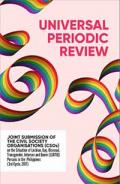
Resource | Publications,
Violations of the rights of LGBTIQ persons persist though not consistently documented. Denial of access to public services including education, health care and housing exist. Negative stereotypes against LGBTIQ persons are perpetuated through policies and practices of some government officials and private actors such as schools. Hate related violence, including killings of LGBTIQ persons, have been reported. Meanwhile, there is an absence of a comprehensive national legal framework recognizing the rights of LGBTIQ persons, prohibiting SOGIESC-based discrimination and ensuring provision of adequate services for LGBTIQ persons in difficult situations.
This report was prepared by LGBTIQ civil society organizations (CSOs) after series consultations to identify priority issues and recommendations.

Resource | Publications,
The report documented various narratives of psychological and physical abuse, including domestic violence, forced marriage, and attempts by family members to change their sexual orientation and gender identity. It looks into other social and economic factors, such as financial dependence on families, and how these affect their lives in Timorese society. Among its recommendations were for government and civil society to facilitate leadership-building opportunities and support groups and to provide lesbian and bisexual women and transgender men "opportunities to enhance their own capacities to help make them active and capable advocates for their own rights."
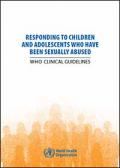
Resource | Guidelines,
Sexual abuse, including sexual assault or rape, of children and adolescents is a major global public health problem, a violation of human rights, and has many health consequences in the short and long term.
This guideline aims to provide evidence-based recommendations for quality clinical care for children and adolescents who have, or may have, been subjected to sexual abuse, in order to mitigate the negative health consequences and improve their well-being. The objectives are to support health-care providers to provide quality, immediate and long-term clinical care and to apply ethical, human-rights-based and trauma-informed good practices in the provision of such care. Where relevant for provision of clinical care and where there is supporting evidence, sex-based differences and gender-based inequalities are flagged.





